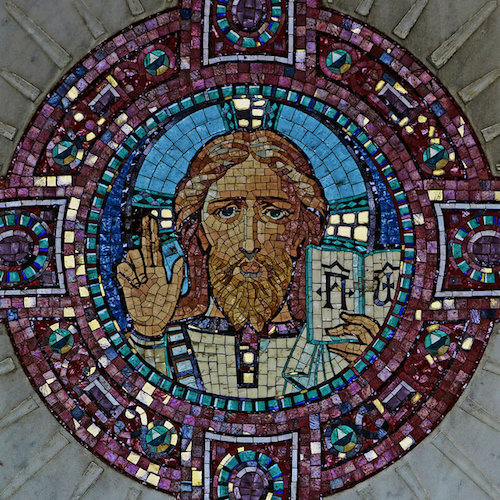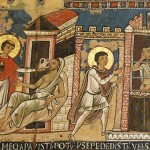We run our website the way we wished the whole internet worked: we provide high quality original content with no ads. We are funded solely by your direct support. Please consider supporting this project.

Jesus, the Word of God
“[T]he standing message of the Fathers to the Church Universal,” writes Georges Florovsky, was that “Christ Jesus is the Alpha and Omega of the Scriptures both the climax and the knot of the Bible.”[1] It was also unquestionably one of the most foundational theological assumptions of Luther and Calvin as well as other Reformers. Hence, for example, Luther argued that, “the function of all interpretation is to find Christ.”[2] In contrast to the so-called “objective” historical-critical approach, certain advocates of the Theological Interpretation of Scripture movement are exploring what it means to affirm that “… all texts in the whole Bible bear a discernible relationship to Christ and are primarily intended as a testimony to Christ,” as Graeme Goldsworthy put it.[3] Hence, “The prime question to put to every text is about how it testifies to Jesus?”[4]
We might say that Jesus is “the Word” of the words. T.F. Torrance succinctly captures the Christocentric focus both of a proper understanding of inspiration and of hermeneutics when he writes:
Since the Scriptures are the result of the inspiration of the Holy Spirit by the will of the Father through Jesus Christ, and since the Word of God who speaks through all the Scriptures became incarnate in Jesus Christ, it is Jesus Christ himself who must constitute the controlling centre in all right interpretation of the Scriptures.[5]
We might view the relationship between the diverse words of Scripture and God’s one and only Incarnate Word by comparing it to the way syllables and letters relate to words we utter or write. Just as syllables and letters find their function in forming the words we utter or write, so the diverse words of Scripture find their sole function in uttering the name “Jesus.” Vern Poythress comes close to this perspective when he states: “The Bible contains many distinct truths in the distinct assertions of its distinct verses.” Yet, in light of the fact that Jesus presented himself as the truth, Poythress adds, “all these cohere in the One who is truth.”[6]
Scott Swain reflects this view when he notes that, while God speaks in a wide diversity of ways throughout the progress of revelation, “ultimately God speaks the same Word … the word Christ.”[7] He continues, “God communicates his Incarnate Word (Jesus Christ) through his inscribed Word (Holy Scripture) for the sake of covenantal communication and communion.”[8]
In this light, we might say that Jesus is thus the truth of all truths, the Word that is spoken in all true words, and the revelation in all that is revelatory in Scripture. Despite its remarkable diversity, when read through the lens of Christ, as Hugh of St. Victor expressed it, “the whole of scripture is one book, and that one book is Christ.”
[1] G. Florovsky, Aspects of Church History, Vol.IV (Belmont, Mass: Nordland Pub. Co., 1975), 38
[2] Dockery, “Christological Hermeneutics,” 191. F.W. Farrar, History of Interpretation (London: Macmillan, 1886), 232.
[3] Goldsworthy, Gospel-Centered Hermeneutics, 252; cf. idem, Preaching the Whole Bible, 21. For an excellent defense of a Christocentric approach to Scripture that is oriented toward its practical significance, see Smith, Bible Made Impossible, 93-126.
[4] Goldsworthy, Gospel-Centered Hermeneutics, 252; cf. idem, Preaching the Whole Bible, 21.
[5] T. F. Torrance, The Trinitarian Faith: The Evangelical Theology of the Ancient Catholic Faith (Edinburgh: Clark, 1988), 39.
[6] V. Poythress, God-Centered Biblical Interpretation (Pillipsburg, NJ, 1999), 58.
[7] S. Swain, Trinity, Revelation and Reading: A Theological Introduction to the Bible and Its Interpretation (New York: T & T Clark, 2011), 25. See ibid., 37.
[8] Swain, ibid., 60.
Photo credit: Leo Reynolds via Visualhunt / CC BY-NC-SA
Category: General
Tags: Bible Interpretation, Cruciform Theology, Jesus
Topics: Biblical Interpretation
Related Reading

Sermon: Letter to Henry
We usually share a short clip from Greg’s sermons here, but we decided that a clip just won’t do this week. This last weekend Greg preached about the life and death of Henry and what it does and does not say about God. You can listen to the sermon and download other resources over at…

When God Wears Masks
At various times throughout the OT we find Yahweh assuming the role of a tester, refiner, punisher and even an enemy of Israel (e.g. Jer. 9:7; Lam. 2:5; Isa 63:10). Yet, when we examine these roles, or masks, in the light of the crucified Christ and the broader canonical witness, it becomes clear that these…

The “Christus Victor” View of the Atonement
God accomplished many things by having his Son become incarnate and die on Calvary. Through Christ God revealed the definitive truth about himself (Rom 5:8, cf. Jn 14:7-10); reconciled all things, including humans, to himself (2 Cor 5:18-19; Col 1:20-22), forgave us our sins (Ac 13:38; Eph 1:7); healed us from our sin-diseased nature (1…

The Most Beautiful Truth
Jesus was God incarnate. Yet he continually referred to, and prayed to, God the Father as someone who was distinct from himself. He also continually referred to, and claimed to be empowered by, God the Holy Spirit as someone distinct from himself. And yet Jesus, along with all Jews of his time, believed there is…

The Call to a Cruciform Life
Jesus repeatedly taught that following him meant that one had to be willing to “pick up their cross daily and follow [him]” (Lk 9:23; 14:27). Picking up our cross is the centerpiece of following Jesus because this was the centerpiece of what Jesus was all about. The thematic centrality of the cross is also illustrated…

Oh Constantine
Once upon a time there was a Roman Emperor named Constantine who used the enemy-loving Jesus to kill his enemies. What does this have to do with us? Find out:
